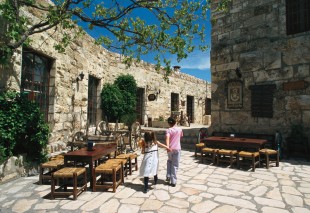

Jordan's culinary journey

Despite recent regional unrest, Jordan’s F&B industry is marching on valiantly, thanks to its dedicated base of culinary experts. Caterer finds out what’s spurring them on
It was all going so well for Jordan in 2010. Tourism was up 16.4% year-on-year [includes overnight-stay and same-day visitors] and the restaurant sub-sector was the largest in the Tourism and Travel Related Services (TTRS). Numbers of employees in the restaurant sub-sector had been growing at anywhere between 500 and 3000 a year since 2005, to work in the ever-growing number of tourist-focused restaurants.
Essam Fakhriddin, chairman of the board of the Jordan Restaurant Association, says: “The culinary and F&B industries in Jordan (particularly Amman) have been growing very strongly since the early 90s due to many factors including a growth in population, a change in consumer behaviour and the need for new food outlets”.
But when the Arab Spring gained momentum in Jordan’s neighbouring countries at the beginning of 2011, the picture changed. Tourism figures fell in 2011, by 20.8% [Jan-Aug compared with the same period in 2010]. Didier Gusching, executive chef at the Radisson Blu Tala Bay Resort Aqaba, in the south of Jordan, was one of the people on the front line who noticed the effect.
“Before the uprisings in the Middle East, we used to have lots of visitors from all over Europe, from the UK and Italy especially, but now chartered flights from there have been cancelled and we don’t see so many Europeans. We’re hoping the flights will start up again in a month or two – maybe for the winter – but until then we’ve adjusted menus and services to meet the needs of our new customers.”
“Thankfully there is a big local community here, and a good local market.” Gusching goes on to explain. “We always keep an eye on what’s going on internationally, but we have to keep our eyes fixed on the local market too – it’s our bread and butter really.”
Amman restaurant owner Madian Al Jazerah, who runs Books@Cafe with his brother, Mazhar, is confident about the future too.
Despite admitting that they did lose business this year due to tour cancellations, he says sales are up around 20%. Al Jazerah thinks it’s because they’ve pitched their outlet just right in the market: “People who frequent more expensive establishments see us as a good deal for the quality. Those on the lower end come to Books@Cafe too for its fair price range,” he says.
Article continues on next page...
Investing in the future
So it seems quick adaptation and pitching concepts at just the right level are the ways to keep businesses afloat, but what next?
One person who is very excited about the future of the Jordanian F&B industry is Tamir Shaaban, PR manager at the Royal Academy of Culinary Arts (RACA), which is based in Amman. The Academy was set up in September 2008 as a not-for-profit organisation after King Abdullah II decreed he wanted to see the country’s F&B industry improved.
The RACA teamed up with Swiss company Les Roches, one of the top hospitality and culinary schools in the world, to manage and operate the academy. It offers a two-year culinary diploma accredited in Jordan and Switzerland, and has the capacity to take 200 students.
Shaaban believes the academy will have a big impact on the Jordanian F&B industry: “Sixty percent of our graduates have entered the labour force directly after graduating, be it in Jordan or another country,” he reveals.
“Those who have left us and gone to work in Jordan start off in middle-level management positions. Others have opted to obtain a further degree from one of our Les Roches campuses in Spain, Switzerland, Australia or the United States.”
When asked if he’s worried about training students that will then take their skills to work in other countries, Tamir says: “It’s not a worry at all. We encourage them to go and gain experience anywhere they can, and we are confident at the end of the day, when they have gained their relevant experience, they will come back to Jordan and have a stronger impact on the industry.”
Article continues on next page...
Planning ahead
It seems supply issues are no longer a big issue in Jordan either: “I never felt there was a shortage of equipment or produce here,” says Gusching. “Everything comes into Amman once a week and we order everything accordingly. If you need something quickly it could be a problem, especially as Aqaba is four hours drive from Amman, but you just need time, good planning and good contacts.
“If we change the menu for example, and I want some foie gras and I can’t find it, I give a call to other chefs and see if they have anything. If I change the menu for the new season I have to check stock and supply first. I just need more than one week.”
Say hello to 2012
So with savvy, well organised F&B experts, an interested ruler, and a new Academy that’s looking to inject talented new culinary professionals into the market, it seems like Jordan is ready to take the challenge of 2012 head on. And there’s no one more excited about the future than Ed Munter, director of food and beverage at the Amman Marriott Hotel.
“The F&B business at the hotel has been affected by the unrest in the Middle East, however, everyone in the market understands that this is only a temporary set-back and the market will eventually not only recover, but resume an extremely progressive growth in the near future, he says.
“In order for us to be prepared for this, all of the restaurant concepts have been refocused to reflect their proper brand positioning and authenticity – what we call ‘concept integrity’ in the business. We have much, much more on the drawing board for 2012 too. The outlook for the F&B industry is as exciting as it is strong.”